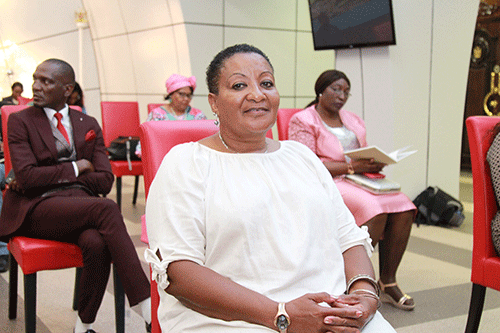The health ministry has said over 11 700 children live with HIV in Namibia, a disease that they have mostly contracted during breastfeeding or later on in life through other mechanisms.
Deputy health minister Esther Utjiua Muinjangue shared this information yesterday at Katutura Hospital on the achievement of successfully transitioning all children and adolescents on antiretroviral therapy (ART) in Namibia to a Dolutegravir (DTG) regimen.
“Today, 97% of children and adolescents living with HIV in Namibia are on the Dolutegravir-based regimen. To date, Dolutegravir is the best possible HIV medicine which is administered combined with other HIV medicines,” said Muinjangue.
The child version of DTG was introduced in August 2021 which was just as the country was coming out of the third, devastating wave of Covid-19.
When HIV medications became available in the country in 2003, people living with HIV were taking up to three tablets at a time more than once a day. However, with advanced research in the field, newer and better medications and formulations are becoming available, including Dolutegravir 10mg (for children).
Namibia has made great strides in HIV treatment in recent years as 94% of people living with HIV know their status, 97% who know their status are receiving treatment, and 93% of those being treated have suppressed viral loads.
The World Health Organisation (WHO) recommends the use of the HIV drug DTG as the preferred first-line and second-line treatment for all populations, including pregnant women and those of childbearing potential. WHO further adds that the HIV drug may also be used, as part of post-exposure prophylaxis, to prevent HIV infection following potential exposure. It is taken by mouth.
“The quality of life has been improved and eventually the mortality and morbidity reduced.
I would like to express gratitude to the caregivers, children and adolescents living with HIV for trusting, believing, and working together with the healthcare workers in this journey of transition,” she shared.
Muinjangue said living with HIV takes courage, particularly as children grow into teens and navigate the complicated world of friendships, relationships and life. Pediatric HIV medications exist in different formulations such as tablets, syrup and granules, and Namibia has all of these.
Children aged four weeks and older, and/or those who are 3kg up to 20kg can take Dolutegravir. Older children will continue to take Dolutegravir into adulthood, but the medication strengths differ.
At the same occasion, the US embassy’s chargé de affaires Jessica Long said it is a huge relief to know there is medicine, meaning HIV is a chronic condition that can be managed.
“There was a time, not that many years ago when there was no medicine for HIV. When people were dying from AIDS. When children were losing parents and caregivers, and when families were losing their children to a disease that had no treatment. We have come so far,” recalled Long.
She added that the US team has provided support in so many areas, starting with assisting the health ministry to procure the first DTG regimens.
“We worked with the ministry on developing educational materials that guide healthcare workers and clinical mentors on how to get all 11 700 plus children living with HIV in Namibia transitioned to this new medicine,” shared Long.
She stated: “We also worked closely with the ministry to track how well the transition was going, working together to develop plans to maintain momentum to ensure that all eligible children and adolescents were reached as quickly as possible.”
She is aware of the role parents, caregivers, and healthcare providers play in supporting children and adolescents living with HIV every day.
“Your roles are so important
in ensuring your children stay on their medication. You remind them to take their medicine, you help them build a routine where they remember to take it themselves, and you strengthen their self-confidence to always have the courage to take their medicine every day so they can live their best life,” Long recapped.
Based on an in-depth piece by Afro News, Namibia introduced a prevention programme in 2002/03, and the component of early infant diagnosis using infant dried blood spot samples from HIV-exposed infants was added in 2005.
Over the years, these interventions have been scaled up nationwide to almost all public health facilities providing maternal and child health services. These services include antenatal care, labour and delivery, postnatal care and child health.


